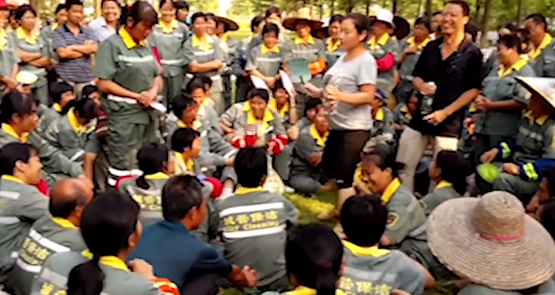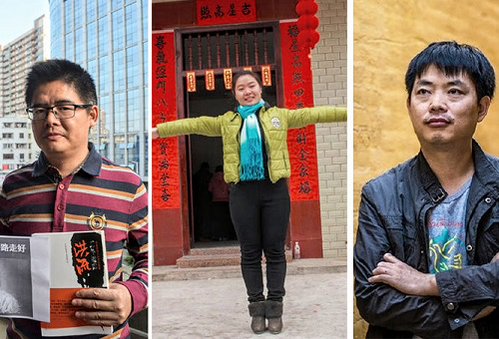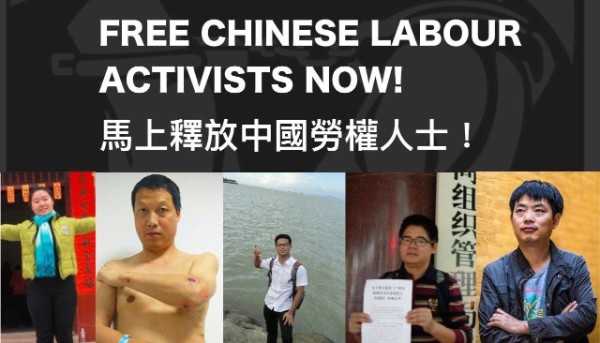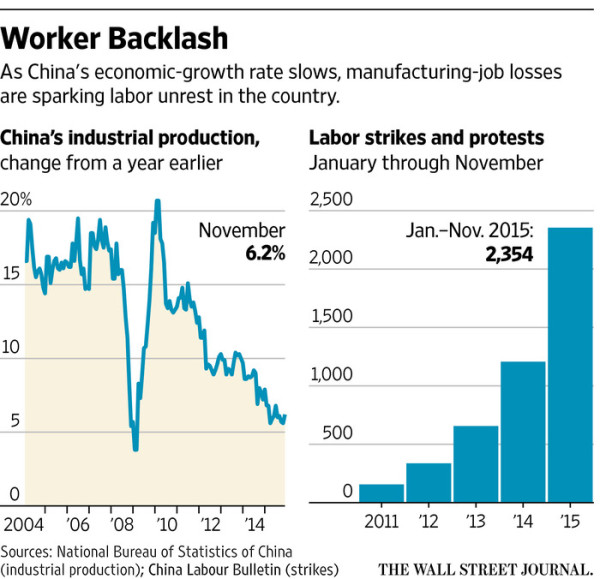Coordinated arrests of labour activists in Guangdong province as workers’ struggles multiply
chinaworker.info reporters
The recent arrests of labour and NGO activists in Guangdong province – “the world’s factory” – is an ominous sign. It is the Chinese regime’s answer to a significant rise in workers’ strikes and factory closures, in an attempt to frighten workers into submission. This should bring forth loud protests, petitions and pickets at Chinese government offices overseas, to show the solidarity of the international workers’ movement.
The latest attacks represent a new phase of Xi Jinping’s crackdown on dissent, the most severe for more than two decades, spreading from human rights lawyers, feminists and anti-corruption whistle-blowers, to the emerging green shoots of an independent labour movement in China.
Police raids
At least 21 Chinese labour activists were arrested in their homes and offices on 3 and 4 December in a clearly coordinated sweep by the Guangdong authorities. The targets were activists with labour-orientated NGOs, which due to the dictatorship’s ban on independent workers’ unions have played an increasing role as advisors and a reference point for workers’ struggles. The detentions followed a similar pattern with police searching offices and homes and seizing belongings including documents and electronic equipment. In addition, more than 50 other labour activists were summonsed to police stations for ‘discussions’. Four NGOs seem to have been targeted in the police raids.
While many of those detained have since been released, five activists are still being held and the whereabouts of two others is uncertain. Zeng Feiyang, who is the director of the Panyu Dagongzu Service Center in Guangzhou, is among those being held along with Zhu Xiaomei, a female labour activist who has been prominent in a number of successful labour struggles. Zhu was closely involved in a battle of university sanitation workers in Guangzhou against outsourcing and, more recently, the strike at the Taiwan-owned Lide footwear factory which forced the company to pay social insurance and housing fund contributions, overtime and other payments it had withheld from the workforce. Zhu, who has a one-year-old baby, has been refused bail despite concerns for the child’s health.
Also being held are He Xiaobo of the Nanfeiyan Social Work Service Organization in Foshan, Peng Jiayong of the Workers’ Mutual Aid Group in Panyu, and activist Deng Xiaoming.
“Disrupting public order”
He Xiaobo has been charged with “embezzlement”, while Zeng, Zhu, and Deng have been charged with “inciting crowds to disrupt public order” – an extremely common accusation against labour activists and workers’ representatives. Lawyers for the detained activists tried to visit them in detention between 7 and 9 December only to be refused access on petty bureaucratic grounds.
The charge of “disrupting public order” has been widely used against labour activists and others the regime wishes to suppress. This same charge was thrown at Lin Dong, an activist with a Shenzhen NGO, in the aftermath of the 40,000-strong Yue Yuen footwear workers’ strike in April 2014, China’s biggest strike for decades. Lin was released and the charges dropped after spending 30 days in detention. In another well-known case, furniture workers’ representative Wu Guijun spent nine months in detention on the same “public order” charge, only to have the charges against him dropped at his trial in June 2014.
These cases were signs of the growing confidence of the nascent worker’s movement especially in Guangdong province, where the largest number of strikes occur. They highlighted an inconsistent response by the authorities, vacillating between repression and a more lenient approach. The latest crackdown and its coordinated character appears to signal a tougher approach, which conforms to the overall pattern of deepening repression under Xi Jinping. An open letter from human rights lawyers in solidarity with the detained activists said this was “the first time in Guangdong or indeed the whole country that there has been such a severe crackdown on such a scale from the government.”

“Economic winter”
These arrests are clearly designed to exercise a deterrent effect on workers, whose preparedness to organise protests is rising dramatically. There have been more than 2,350 strikes in the first eleven months of this year, almost double the number for the whole of 2014. The sharp economic slowdown, which looks set to continue into next year, has seen a wave of factory closures with capitalists sometimes absconding without paying their workers. Even multinational companies that have relocated to other cheaper parts of China or neighbouring countries have tried to cheat workers out of legally prescribed levels of compensation.
Last year, Guangdong’s GDP increased officially by 7.8 percent, in line with the national rate of expansion, although these figures are widely regarded as inflated. What is not disputed is that the province is undergoing rapid deindustrialisation and many parts of its manufacturing industry are experiencing an “economic winter”. According to Wu Jenn Chang, the chairman of the Enterprises Association of Guangzhou, at least 30 percent of Taiwan-invested companies have left Guangdong in the past couple of years, many moving to Vietnam or other lower-wage economies. Big names like Microsoft, Nokia and Citizen Watches have closed factories and dismissed thousands in the past few months.
“Early in China’s slowdown, its economy was able to absorb many labourers,” reports The Wall Street Journal (14 December). “But as the downturn lingers, layoffs are becoming more common and desperate workers are finding few new opportunities – a trend officials and labour experts say is gathering momentum.” This newspaper quotes a former company director from Dongguan, “If the economy keeps going this way we’ll have serious social unrest in a couple of years.”
The hardening environment is behind the current upturn in workers’ struggles. In November, China saw 301 strikes, the highest monthly total this year, with Guangdong leading the way. Hong Kong-based website China Labour Bulletin says there were 56 strikes and protests in the province in November, which is more than double the level in July. The majority of workers’ strikes are over unpaid wages or compensation often in connection with factory closures.
The latest crackdown on labour NGOs is clearly an attempt by the regime, according to its perspective, to ‘behead’ the emerging workers’ movement. They rightly fear that in conditions of economic downturn and a brutal so-called restructuring the fledgling workers’ movement can acquire massive momentum, with strikes and protests perhaps spilling beyond the bounds of individual factories and linking up in coordinated district-wide or citywide movements.
Xi’s crackdown
This turn of events is ironic considering that typically NGO activists in China are very cautious and have sought to avoid open criticisms of the regime, arguing for workers to limit their struggles to economic concerns. But the Guangdong arrests are in keeping with Xi Jinping’s wider crackdown on moderate dissidents and within-the-system critics, which previously were afforded a certain limited leeway to speak out. This provided a ‘safety valve’ and outlet for discontent against the dictatorial regime, which Xi now seems determined to close.
The persecution of labour activists in Guangdong could be followed by much harsher controls on NGOs under new legislation which is on its way. This is likely to be accompanied by a new wave of nationalist state propaganda under the regime’s “foreign-backed colour revolution” narrative, branding labour NGOs as foreign-influenced.
This is why workers and socialists around the world should speak out and take solidarity action to support the Guangdong detainees. This can be done by signing online petitions and sending protest letters (see chinaworker.info) and by organising protests at Chinese government offices in your own country.
- For the immediate release of Zeng Feiyang, Zhu Xiaomei, He Xiaobo, Peng Jiayong and Deng Xiaoming!
- End the persecution of Chinese labour activists! End state repression against workers’ strikes!
- For the right of workers in China to form independent and democratic trade unions to fight for jobs, wages, social insurance and a safe workplace environment!
- International working class solidarity against austerity and repression!
Sign the petition organised by HKCTU and other groups here.






